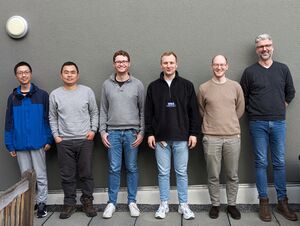

Nanomaterials for green energy group






The Nanomaterials for green energy group focusses on the study of catalyst nanoparticles and nanomaterials for energy storage and conversion processes. The main objective is to understand the relationship between the atomic-scale microstructure and the electrochemical performance of nanoparticle catalysts and nanomaterials for a rational design of more advanced nanomaterials.
Group members
- Marc Heggen (permanent staff)
- Paul Paciok (Postdoc)
- Pengfei Cao (currently ERC-2, Postdoc)
- Ansgar Meise (PhD student)
- Therese Cibaka Ebambi (PhD student with IEK-5)
- Robert Zandonella (PhD student with Paul Paciok)
- Gungyi Guo (PhD student, visitor from MPI for Iron research)
- Kateryna Loza (permanent staff at Universität Duisburg-Essen)
- Nina Siebers (permanent staff at IBG-3)
Former group members
- Marharyta Okhrymenko (visiting student, Dec. 2023 - Jan. 2024)
- Pengyi Tang (Postdoc, Oct. 2017 - Febr. 2018, June 2019 - May 2021)
- Karel Vareka (visiting PhD student, July 2022 - August 2022)
- Katherine MacArthur (Postdoc, Nov. 2015 - Nov. 2021)
- Xiankui Wei (Postdoc, June 2016 - May 2019)
- Yuanxu Gao (Master student, May 2018 - April 2019)
- Zhanqi Chen (Master student, August 2018 - April 2019)
- InHyang Kang (DAAD student, July – Sept 2018)
- Antoine Clement (visiting student, July – Sept 2018)
- Shabbir Tahir (Master student, May 2019 - Febr 2020)
- Meital Shviro (Postdoc, 2016 - 2017)
- Martin Gocyla (PhD student, Jan 2015 - Dec 2017)
Third-party funds projects
current projects:
Verbundprojekt im 7. Energieforschungsprogramm der Bundesregierung founded by Bundesministeriums für Wirtschaft und Energie:
„Entwicklung von porenoptimierten Katalysatoren und Katalysatorschichten für Hochleistungs-Polymer-Elektrolyt-Membran-Brennstoffzellen“ POREForm
“Development of pore-optimized catalysts and catalyst layers for high-performance polymer electrolyte membrane fuel cells” POREForm
Partners:
- IEK-11, FZ-Jülich (Prof. Dr. Karl Mayrhofer)
- Max-Planck-Institut für Kohlenforschung, Mühlheim (Prof. Dr. Ferdi Schüth)
- Max-Planck-Institut für Chemische Energiekonversion, Mühlheim (Prof. Dr. A. Auer)
- Technische Elektrochemie, TU-München (Prof. Hubert Gasteiger)
- Department Chemie- und Bioingenieurwesen, U Erlangen-Nürnberg (Prof. Matthias Thommes)
- Technische Universität Darmstadt (Dr. Marc Ledendecker)
- Umicore AG & Co. KG, Hanau-Wolfgang (Dr. Daniel Herein)
DFG project:
"Investigation of dynamic material changes of ZnPd / ZnO catalysts in methanol steam reforming at the atomic level" (2020 - 2023)
(1 PhD position, 3 years)
Partner:
- TU Chmnitz (Prof. Marc Armbrüster)
DFG project:
„Synthese, Struktur und biologische Effekte von ultrakleinen (1-2 nm) bimetallischen Silber-Platin-Nanopartikeln“
Partners:
- Universität Duisburg-Essen (Prof. Matthias Epple)
- Universitätsklinikum Bergmannsheil, Bochum (Prof. Christina Sengstock)
previous projects:
DFG project:
„Nanoscale Pt Alloy electrocatalysts with well-defined shapes: Synthesis, Electrochemical Analysis, and ex-situ/in-situ Transmission Electron Microscopy Studies.“ (April 2019 – March 2022)
(1 post-doctoral researcher, 3 years)
Partner:
- TU Berlin (Prof. Peter Strasser)
Verbundprojekt im 6. Energieforschungsprogramm der Bundesregierung founded by Bundesministeriums für Wirtschaft und Energie:
"Development of cost-effective high-performance gas diffusion electrodes for polymer electrolyte membrane fuel cells (PEM-FC) with low Pt coverage on the basis of novel, graphitized hollow-sphere carbon carrier materials.“
(1 Postdoc Position, 3 years)
Partners:
- IEK-11, FZ-Jülich (Prof. Dr. Karl Mayrhofer)
- Max-Planck-Institut für Kohlenforschung, Mühlheim (Prof. Dr. Ferdi Schüth)
- Max-Planck-Institut für Chemische Energiekonversion, Mühlheim (Prof. Dr. A. Auer)
- Max Planck Institut für Eisenforschung in Düsseldorf
- Zentrum für Brennstoffzellentechnik GmbH, Duisburg
- Umicore AG & Co. KG, Hanau-Wolfgang
DFG project:
„Bimetallische Nanopartikel der Platinmetalle (Ru, Rh, Pd, Os, Ir, Pt) und des Silbers: Synthese, Mikrostruktur und biologische Wirkung.“
(1 Postdoc position in cooperation with Univ. Duisburg-Essen, 3 years)
Partners:
- Universität Duisburg-Essen (Prof. Matthias Epple)
- Universitätsklinikum Bergmannsheil, Bochum (Prof. Christina Sengstock)
Horizon 2020 research and innovation program by European Union:
„Towards Replacement of Critical Catalyst Materials by Rational Design of Novel Transition Metal Nanoparticles (CritCat).“
(1 Postdoc Position, 3 years)
Partners:
- Tampere University of Technology, Finland
- Aalto University, Finland
- University of Birmingham, UK
- National Physical Laboratory, UK
- International Iberian Nanotechnology Laboratory, Portugal
- Syngaschem B.V., Netherlands
- Tethis S.p.A., Italy
Helmholtz Postdoc program:
“Quantitative Characterization of Fuel Cell Catalyst Nanoparticles.“.
(1 Postdoc Position, 3 years)
Partners:
- University of Cambridge
- University of Melbourne
Helmholtz Postdoc program:
“Bioaccessibility of soil nutrients in relation to aggregate microstructure“
(1 Postdoc position by IBG-3 in cooperation with ER-C, 3 years)
Partner:
- Erwin Klumpp, IBG-3
DFG project:
“Well-defined Nanoscale Shaped Pt Alloy Electrocatalysts: Synthesis, Electrochemical Analysis, and ex-situ/in-situ TEM Studies.“ (Jan 2015 – Dec 2017)
(1 doctoral student, 3 years)
Partner:
- TU Berlin (Prof. Peter Strasser)
Scholarship program for excellent post-doctoral students by The Council of Higher Education of Israel:
“Synthesis, electrochemistry and structure of shaped nanoparticle catalysts.”
(1 Postdoc, 2 years)
Partner:
- Bar-Ilan University (Prof. David Zitoun)
Cooperation partners
- Prof. Peter Strasser, TU Berlin
- Prof. Dr. Karl Mayrhofer, Helmholtz Institute Erlangen-Nürnberg
- Prof. Dr. Ferdi Schüth, MPI KoFo, Mühlheim
- Prof. Dr. Alexander A. Auer, MPI, Mühlheim
- Prof. Matthias Epple, Universität Duisburg-Essen
- Prof. Marc Armbrüster, TU-Chemnitz, Germany
- Prof. Jaakko Akola, Tampere University of Technology, Finland
- Prof. Lin Gan, Tsinghua University, China
- Prof. Feng Wang, Dalian National Laboratory for Clean Energy, China
- Dr. Thomas Lunkenbein, Prof. Robert Schlögl, FHI Berlin
- Dr. Simon Penner, Universität Innsbruck, Österreich
- Dr. Marc Georg Willinger, Scientific Center for Optical and Electron Microscopy, ETH Zürich
- Prof. Jordi Arbiol, ICREA and Catalan Institute of Nanoscience and Nanotechnology
- Prof. Mehtap Özaslan, Institut für Chemie, Universität Oldenburg
- Prof. Beatriz Roldán Cuenya, Fritz Haber-Institut, Max-Planck-Gesellschaft, Berlin